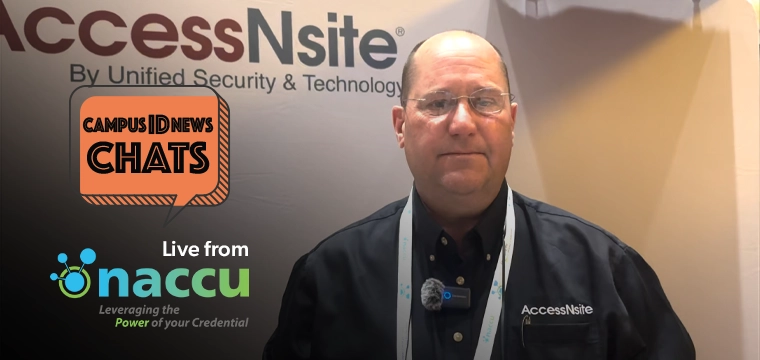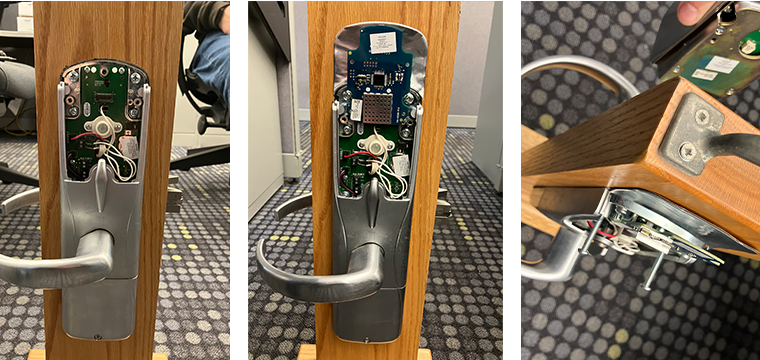
ASSA ABLOY on the evolution of campus card technology, and the advantages of going smart
Angelo Faenza, general manager, PERSONA, senior director campus electronic access control security solutions, ASSA ABLOY Door Security Solutions
The student ID card is as universal a part of college life as textbooks, laptops and cramming for exams. On most college campuses students use their card to get into their residence hall, buy meals, take out a library book and gain access to other areas and activities. However, like anything else about college life, the campus card is evolving, and so are the access control products associated with it.
Mag stripe has been the predominant technology for the campus card for many years, and rightly so for a number of reasons: they work well, they’re affordable, and they’re interoperable with banking and retail systems. Because of these benefits, almost every transaction on campus can be conducted using a mag stripe card.
The vast majority of campuses still use mag stripe card technology, but more and more are migrating to smart card credentials. Many universities are also investigating or implementing mobile access. Should you be doing so as well? Can this be done cost-effectively?
Making the move to smart card technology offers a variety of advantages. Smart cards are more secure – they offer layers of protection that are not easily duplicated or counterfeited.
A smart card, by virtue of its integrated chip, provides more space, or memory, for additional functions. For this reason, smart cards can have multi-function capabilities that go beyond just opening doors and paying for goods and services. For example, smart cards can be used to track student attendance, provide access to transportation services or even track and monitor what a student buys at the cafeteria to help maintain a healthy diet.
Another advantage of smart card technology is that it’s highly scalable, providing a pathway for additional functions to be added over time. New systems can be readily put in place. For example, maybe your campus is looking at implementing or upgrading a parking management or transportation system. Smart card technology could provide a ready solution.
Banks, public transportation systems and other institutions are already beginning to transition to smart card technology for these very reasons. As this transition occurs, students will increasingly expect a smart card experience throughout their daily lives on campus. Making the move to smart card locks, readers, systems and software may seem like a major undertaking that would require a large upfront investment and significant changes across campus. However, many systems as well as the user experience can remain the same.
Because smart cards can be programmed with the same information as the mag stripe card, many systems will only need something as simple as a reader upgrade to begin the transition. Upfront planning with your smart card vendor can save you a great deal of time and expense in the move to smart cards by programming the same information on the new cards. This allows campus systems to remain largely unchanged.
Students would still be able to use their smart card to access dorms and other areas, and to pay for goods and services on campus. A simple reader upgrade in vending machines will keep snackers happy.
Security personnel, meanwhile, would still have audit trail capabilities and know who opened a door and when. So for convenience, simplicity of credentials management, and perhaps above all, familiarity, you’d still have a single card platform that would work for everything students need.
For those responsible for campus security, the decision to upgrade is a big one. But it’s made easier by an important, practical consideration: locks are available that can read both mag stripe cards and smart cards.
Multi-technology locks allow colleges and universities to transition their cardholder population to smart cards over time to reduce upfront costs and simplify management. These locks can be deployed prior to the decision to move to smart cards, as they work seamlessly with your existing mag stripe cards.
Once the decision is made to migrate the campus to smart cards, the university can begin issuing new smart cards to the incoming freshman class while the existing population continues to use their mag stripe cards. Over the period of four or five years, the entire campus will have transitioned seamlessly to smart cards without a large initial investment.
The same principle applies for campuses that have mixed credential technologies. Multi-technology locks allow campuses to consolidate to a single smart credential as budget allows. Or in many cases, campuses may wish to transition their students and faculty over to smart cards, while continuing to use mag stripe cards for summer conferences or other cost-sensitive programs.
Multi-technology locks also provide the flexibility to support emerging technologies such as mobile access. A mobile access platform can replace keys or cards in university environments across a variety of locations, including residence halls. Additionally, since students will rarely part with their phones, the technology offers an added layer of security. This means students and staff must use their own credential and can only gain access to the areas for which they are authorized.
Every campus is unique and while no one-size-fits-all solution exists, smart card technology opens up exciting new possibilities for improving the implementation and effectiveness of campus security.
At the close of each year, AVISIAN Publishing’s editorial team selects a group of key leaders from various sectors of the market to serve as Expert Panelists. Individuals are asked to share their unique insight into different aspects of the campus card market. During the months of December and January, these panelist’s predictions are published at CR80News.




